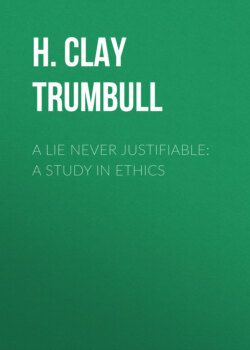Читать книгу A Lie Never Justifiable: A Study in Ethics - H. Clay Trumbull - Страница 10
На сайте Литреса книга снята с продажи.
VI. CENTURIES OF DISCUSSION.
ОглавлениеWide Differences of Opinion.—Views of Talmudists.—Hamburger's
Testimony.—Strictness in Principle.—Exceptions in Practice.—Isaac
Abohab's Testimony.—Christian Fathers not Agreed.—Martyrdom Price
of Truthtelling.—Justin Martyr's Testimony.—Temptations of
Early Christians.—Words of Shepherd of Hermas.—Tertullian's
Estimate.—Origen on False Speaking.—Peter and Paul at Antioch.—
Gregory of Nyssa and Basil the Great.—Deceit in Interests of
Harmony.—Chrysostom's Deception of Basil.—Chrysostom's Defense
of Deceit.—Augustine's Firmness of Position.—Condemnation of
Lying.—Examination of Excuses.—Jerome's Weakness and Error.—Final
Agreement with Augustine.—Repetition of Arguments of Augustine and
Chrysostom.—Representative Disputants.—Thomas Aquinas.—Masterly
Discussion.—Errors of Duns Scotus.—John Calvin.—Martin Luther.—
Ignatius Loyola.—Position of Jesuits.—Protestants Defending Lying.
—Jeremy Taylor.—Errors and Inconsistencies.—Wrong Definitions.—
Misapplication of Scripture.—Richard Rothe.—Character, Ability,
and Influence. in Definition of Lie.—Failure to Recognize.—Error
Love to God as Only Basis of Love to Man.—Exceptions in Favor of
Lying.—Nitzsch's Claim of Wiser and Nobler Methods than Lying in
Love.—Rothe's Claim of Responsibility of Loving Guardianship—No
Countenance of Deception in Example of Jesus.—Prime Error of Rothe.
—Opinions of Contemporary Critics.—Isaac Augustus Dorner.—
Character and Principles.—Keen Definitions.—High Standards.—
Clearness and Consistency.—Hans Lassen Martensen.—Logic Swayed by
Feeling.—Right Premises and Wavering Reasonings.—Lofty Ideals.—
Story of Jeanie Deans.—Correct Conclusions.—Influence of Personal
Peculiarities on Ethical Convictions.—Contrast of Charles Hodge and
James H. Thornwell.—Dr. Hodge's Correct Premises and Amiable
Inconsistencies.—Truth the Substratum of Deity.—Misconceptions of
Bible Teachings.—Suggestion of Deception by Jesus Christ.—Error as
to General Opinion of Christians.—Dr. Hodge's Conclusions Crushed
by his Premises.—Dr. Thornwell's Thorough Treatment of Subject.—
Right Basis.—Sound Argument.—Correct Definitions.—Firmness for
Truth.—Newman Smyth's Manual.—Good Beginning and Bad Ending.—
Confusion of Terms.—Inconsistencies in Argument.—Loose Reasoning.
—Dangerous Teachings.—James Martineau.—Fine Moral Sense.—Conflict
between Feeling and Conviction.—Safe Instincts.—Thomas Fowler.—
Higher Expediency of Veracity.—Importance to General Good.—Leslie
Stephen.—Duty of Veracity Result of Moral Progress.—Kant and
Fichte.—Jacobi Misrepresented.—False Assumptions by Advocates of Lie
of Necessity.—Enemies in Warfare not Justified in Lying.—Testimony
of Cicero.—Macaulay on Lord Clive's Treachery.—Woolsey on
International Law.—No Place for Lying in Medical Ethics.—Opinions
and Experiences of Physicians.—Pliny's Story of Roman Matron.—Victor
Hugo's Sister Simplice.—Words of Abbé Sicard.—Tact and
Principle.—Legal Ethics.—Whewell's View.—Opinion of Chief-Justice
Sharswood.—Mistakes of Dr. Hodge.—Lord Brougham's Claim.—False
Charge against Charles Phillips.—Chancellor Kent on Moral
Obligations in Law and in Equity.—Clerical Profession Chiefly
Involved.—Clergymen for and against Lying.—Temptation to Lies of
Love.—Supreme Importance of Sound Principle.—Duty of Veracity to
Lower Animals.—Dr. Dabney's View.—Views of Dr. Newman Smyth.—Duty
of Truthfulness an Obligation toward God.—Lower Animals not Exempt
from Principle of Universal Application.—Fishing.—Hunting.—Catching
Horse.—Professor Bowne's Psychological View.—No Place for Lying
in God's Universe.—Small Improvement on Chrysostom's Argument for
Lying.—Limits of Consistency in Logical Plea.—God, or Satan.
